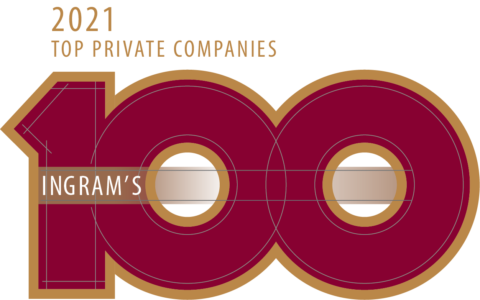HOME | ABOUT US | MEDIA KIT | CONTACT US | INQUIRE
HOME | ABOUT US | MEDIA KIT | CONTACT US | INQUIRE
May 2021

When a major calamity visits the U.S. economy, the numbers tell the story. For the Ingram’s 100, our annual rendition of the region’s largest private companies, the story this year is a tale of winners and losers on a playing field tilted beyond the imagination of any executive—or employee—when 2020 dawned.
By now, we’re all familiar with those who were hurt the most: Anyone connected to the hospitality sector, including travel services and restaurants. We know that owners of office buildings and landlords in general saw their revenues plunge and their very business models imperiled. The vortex even sucked jobs from the public sector, with state and local government employment down 1.1 million positions over the past year.
And yet, as bad as things were in March and April of 2020, though, a record-setting rebound has largely restored a sense of order. Across Missouri and Kansas, the jobless rates a year after COVID-19 hit are, incredibly, within about one-half of a percentage point of where they were at the zenith of the preceding economic boom. Banks and financial institutions, it turns out, generally had a solid year. Logistics companies feeding the surge in e-commerce also fared quite well—Amazon, the poster child for that sector, nearly doubled its work force by adding 400,000 jobs during the year.
We are not, however, all the way back. In some cases, it will take years to produce a full recovery to pre-pandemic levels. The world experienced the biggest disruption in its supply chains in modern history during this crisis. Few manufacturing enterprises have been spared that pain, and the same goes for a construction sector rocked by shortages of vital materials like lumber and metals.
But by and large, things are moving in the right direction. In some cases, perhaps, too fast.
“The work is coming now,” says Michael Hoehn, CEO of Automatic Systems, Inc., which makes production-line equipment for large-scale manufacturers, like automakers. The company saw a significant decline in revenues for the year, but that’s turning around, big-time. “What a whipsaw we’ve all experienced—famine turned to feast,” Hoehn said. “And now we’re all drinking from the fire hose and fighting through all the supply-chain issues of everyone scaling everything at the same time.”
Compared to 2020, though, that’s a great problem to have.
A more granular examination of this year’s Ingram’s 100 shows that, at the top, the pillars of regional commerce stood strong, pandemic notwithstanding. No. 1 for each of the previous 10 years of this feature, Dairy Farmers of America, saw its combined revenues jump by an impressive $2 billion. A good portion of that surge could be attributed to last year’s acquisition of Dean Foods, but there’s little question that demand for dairy products remained strong.
Just shy of $1 billion in growth was the perennial No. 2 on this list, Associated Wholesale Grocers. And nearly matching AWG for top-line growth was the University of Kansas Health System, up $850 million despite massive disruption in its business model as it mustered an army of health-care workers into full combat mode.
Busting their way past the $100 million revenue mark to earn their first recognition on this roster of heavyweights were Safe Haven Security Systems, a recent-years fast-growth company, and HeartLand, the parent of a growing series of commercial landscaping enterprises operating in four states.
And the biggest move up the ranks came from NBKC, which saw its 2020 revenues explode by nearly 275 percent to jump more than 40 spots in the rankings.